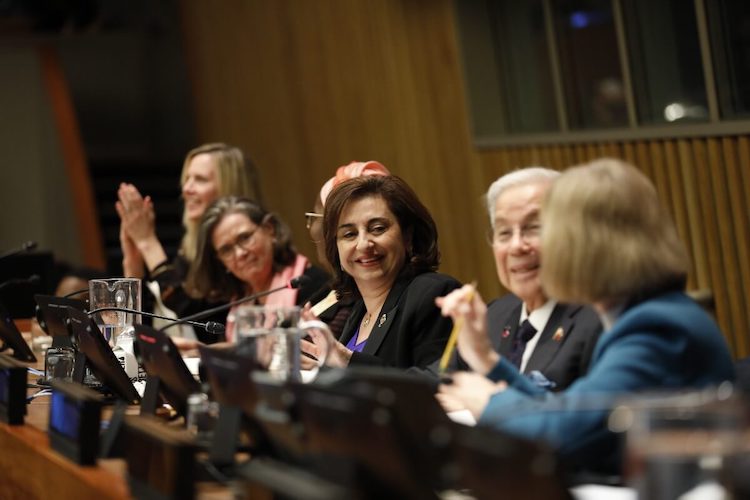By Caroline Mwanga
NEW YORK | 23 March 2024 (IDN) — UN Member States have pledged to boost financing and institutions to eradicate women’s and girls’ poverty. The outcome document (or Agreed Conclusions) of the 68th session of the Commission on the Status of Women (CSW68) points out that women and girls living in poverty become ‘shock absorbers’ in times of crisis, and that further efforts are needed to increase resources to address women’s and girls’ poverty.
The Commission’s decisions are important in view of the 30th anniversary of the adoption of the Beijing Platform for Action in 2025. This commemoration will be an opportunity to reinforce the Beijing actions, and to ensure they are included in the implementation of other global commitments, such as the 2030 Agenda for Sustainable Development and its 17 Sustainable Development Goals, among others. Ahead of that, the 69th session of the Commission on the Status of Women (CSW69) will take place from 10 to 21 March 2025 in New York.
UN Secretary-General António Guterres warned in his report to the Commission that worldwide 10.3 per cent of women live in extreme poverty, and progress towards ending poverty needs to be 26 times faster to achieve the Sustainable Development Goals by 2030.
It remains to be seen how far the Commission commitment will address gender inequalities. Over 100 million women and girls could be lifted out of poverty if governments prioritized education and family planning, fair and equal wages, and expanded social benefits. Almost 300 million jobs could be created by 2035 through investments in care services. Closing gender gaps in employment could boost Gross Domestic Product (GDP) per capita by 20 per cent across all regions.
The two-week session is the largest UN gathering on gender equality brought together world leaders—including two Heads of State, three vice-presidents and over 100 Ministers—and 4,800 representatives of civil-society organizations, marking the second-highest attendance in CSW records.
Crisis-prone world
The CSW68 outcome document acknowledges that the international financial architecture is not fit for a crisis-prone world. It calls for reforms to enable countries to mobilize and invest resources in gender equality. These measures include debt relief and progressive taxation and ensuring that public resources are allocated to address the needs and rights of women and girls.
The Agreed Conclusions also recommend mobilizing financial resources from public and private sources, strengthening the international financial architecture, ensuring a gender lens in national budgeting processes, and preventing regressive taxation that disproportionately impacts women and girls with low or no income.
The outcome document also calls for increasing official development assistance to address women’s and girls’ poverty. The share of total aid with gender equality as a policy objective decreased for the first time in a decade from 45 in 2019 to 43 per cent in 2020, per the latest data of the Organisation for Economic Co-operation and Development (OECD).
Besides, the Commission’s outcome document stresses the need for implementing gender-responsive economic and social policies, including increased women’s representation, leadership and participation in economic institutions, enforcing core labour standards to ensure equal pay for work of equal value, and implementing policies to support women-owned businesses.
The Commission points out that engaging and financing women’s organizations is another key recommendation. Flexible and multi-year financing for locally led feminist movements and women’s rights organizations is critical to address poverty, as proven by existing mechanisms such as the UN Trust Fund to End Violence Against Women and the Women’s Peace and Humanitarian Fund.
The Agreed Conclusions furthermore call to strengthen national capacities to collect and use disaggregated data on multidimensional poverty, and to adopt new development strategies towards sustainable economies. These include strengthening inclusive and gender-responsive social protection systems and scaling up investment in the care economy to reduce women’s time and income poverty and expand their employment opportunities.
The participation of young people
During the session, the Commission also adopted a resolution on HIV-AIDS led by the Southern Africa Development Community (SADC), which urges increased investment in gender equality and the empowerment of all women and girls in the HIV-AIDS response.
UN Member States, intergovernmental organizations and UN entities organised about 270 side events at CSW68. As part of the NGO CSW68 Forum, civil society and youth-led organizations arranged more than 760 parallel events.
The participation of young people, including adolescent girls, across the various sessions, including the Youth Forum, enabled youth delegates to exchange experiences, knowledge, lessons learned and good practices with an emphasis on the multiple dimensions of inequality which exacerbate how young women and girls experience poverty.
The sessions, particularly the Youth Interactive Dialogue, demonstrated the importance of continuing with the practice of integrating critical youth perspectives in the official sessions of the CSW. [IDN-InDepthNews]
Photo: Final meeting of the 68th session of the Commission on the Status of Women (CSW68) on 22 March which pledged agreed solutions to strengthen financing and institutions to eradicate women’s and girls’ poverty. Photo: UN Women | Ryan Brown












